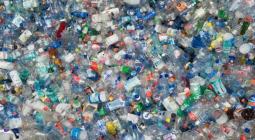Over half of countries push for plastic production cuts in new UN pact
Ahead of hard-fought negotiations due to resume in August, 95 countries have issued a “wake up” call for an “ambitious” plastics treaty
Ninety-five countries across continents have called for the adoption of an “ambitious” UN pact to tackle plastic pollution that includes targets to reduce plastic production – a growing source of planet-heating emissions.
The show of unity comes two months before governments are due to restart formal negotiations on a treaty in Geneva, Switzerland, after they dramatically failed to reach agreement at what was supposed to be the last round of talks late last year.
In Busan, South Korea, a handful of oil and gas-producing states – vocally led by Saudi Arabia, Russia and Iran – blocked a push to include caps on the production of new plastic, arguing the pact should be limited to addressing consumption and recycling.
“This declaration sends a clear and strong message: we will not give up,” Agnes Pannier-Runacher, France’s minister of ecological transition, said on Tuesday at the launch of the declaration on the sidelines of the UN Ocean Conference in Nice, France.
“We cannot lie to them [our citizens] and to ourselves by saying that waste management and recycling will be enough to solve the problem. It’s a lie,” she added.
Lifeline for fossil fuel industry
Signatories to the declaration include European countries, Australia, Canada, Colombia and Mexico, as well as many African and Pacific island nations. No major plastic producers – such as China, the US, Saudi Arabia, India and South Korea – have endorsed the call.
Nearly all plastics are derived from oil and gas and, as the world gradually starts to wean itself off fossil fuels for energy, countries and companies that profit from carbon-based fuels view an expected ramp-up in plastic production as a lifeline for their industry.
The $712-billion plastics industry is set to at least double by 2050, which would see plastic production account for nearly a third of the remaining global carbon budget for staying below 1.5 degrees Celsius of warming.
In the Nice declaration, countries are calling for the adoption of a “global target” to reduce the production and consumption of the building block of plastic items to “sustainable levels”. The goal would be regularly adjusted to raise ambition and countries would be required to report on their production, imports and exports of primary plastic polymers, it added.
“A treaty that does not reduce plastic production will be empty paper,” said Lena Estrada, Colombia’s minister of environment, who called the declaration “an act of courage”.
The statement also calls for a binding obligation to phase out “the most problematic plastic products and chemicals” used in the manufacturing process and for “new and additional finance” that would support the implementation of the treaty.
Estrada called on opposing countries to act in good faith. “It’s not too late to stand with us,” she added.
Ambitious treaty or no treaty?
Alicia Barcena, Mexico’s minister for the environment and natural resources, said the Geneva talks in August will “mark a turning point” in the hard-fought negotiations that began over three years ago.
But she acknowledged that a treaty might not be concluded there as deep divisions remain. “We’re going to go to Geneva with the intention of getting as much as we can,” Barcena told journalists in Nice. “That doesn’t mean that the treaty might be finalised there. It depends if we want a mediocre or… an ambitious one.”
If the negotiations prove unsuccessful once again, governments could weigh up other options. Dennis Clare, a legal advisor for the Pacific Island state of Micronesia at the talks, told Climate Home that if the so-called ‘high-ambition’ group of countries cannot get an agreement through the current UN process, they can “bypass the blockers and do a deal elsewhere”.
While longstanding fault lines persist, it is unclear what position the United States will take in the next round of talks.
With Joe Biden at the helm, it offered lukewarm support for production caps. The new administration has not yet indicated its plans for the negotiations or whether it will even show up. But President Donald Trump strongly supports the fossil fuel industry and has already taken token measures to undo Biden’s efforts to cut plastic use, such as ending efforts to replace plastic straws with paper ones.
Speaking at Tuesday’s press conference, a French official said they had held informal discussions with the US. “Clearly there are some changes but we don’t know exactly what will happen,” she added.
Cover photo: Civil society members call for a strong plastics treaty at the fourth round of negotiations in April 2024. Photo: IISD/ENB - Kiara Worth


